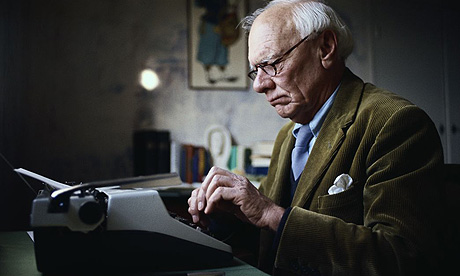
I don't mean to boast, but I have now met the most elusive men in British theatre. More than that, I have shared a drink with them. I can confirm that the West End Whingers actually exist, and are indeed called Andrew and Phil (though, thinking about it now, I forgot to ask for some ID – so it's possible they employed body doubles).
We met on Monday night at a Royal Court panel debate organised by Karen Fricker of Royal Holloway and Variety. Also on the panel were Charles Spencer of the Telegraph and Judith Dimant of Complicite. Our topic: the future of criticism in the internet age.
This is something of a biggie, of course, which is why I beg your indulgence in posting on it again – not least because I know we've booted around the debate plenty before. But I think it's worth returning to, not least because, as Karen's own magazine reported a few days back, American critics are having a tough time of it at the moment. Classical music and dance critics have been declared surplus to requirements on several papers; in New York State theatre critic Jacques le Sourd has been given his marching orders from local paper the Journal News. You can understand why a full-time critic such as Spencer (and a cheerily self-confessed "luddite" at that) admitted he was nervous.
The kneejerk reaction is to blame this on the internet, of course, and in the largest sense – in which newspapers face a gruesome combination of declining circulation, fewer pages and falling advertising revenue – that's accurate enough. In truth, though, as we discussed on Monday, it's far more complex than that. We (or at least I) don't know the ins and outs of the individual cases of critics being sacked; it's also difficult to imagine a scenario in which a paper has decided to get rid of one of its critics simply because more people in the real world are keeping blogs. It's stupid if papers haven't managed to adjust to the web age. It's doubly stupid for them to respond by getting rid of the one thing that (at least in theory) makes them worth reading: the specialist journalists they employ. It's hard to imagine that readers are going to be any more likely to read bought-in agency reports instead, which means the destructive cycle goes on.
I also suspect that in fretting about newspapers and their sales we're in danger of missing the bigger question posed by all this: what is criticism actually for? How can it adapt to an age in which we're told everyone wants to be a critic, yet fewer people find it possible to get paid to be just that?
My instinct is that criticism has to evolve, to recognise the forces challenging it without abandoning the bottom line. Yes, it's important for editors to commission robustly independent reviews; but it's also important for us to encourage differing opinions, and allow people to tell us about things we've missed, whether the price of tickets or the horrors of restricted-view seats. Yes, we should support specialist voices and encourage experienced judgment, but we shouldn't allow theatre critics to become isolated from what's happening in other art forms or the wider world. Yes, we should care about the written word and encourage it to flourish – but we must also experiment with other ways of reaching audiences too, whether it's via video, social networking, Twitter, or whatever else is waiting round the corner. Yes, we should cover shows when they open, but we shouldn't shackle ourselves to a diary decided in advance by PR companies, as if every performance after press night wasn't worth bothering with. And – as all the above sounds ominously worthy – we should encourage serious debate about the art form we care about, but as the Whingers reminded us, we shouldn't lose sight of the most important thing of all: talking about theatre is meant to be exhilarating, interesting, fun.
Like all utopian visions, achieving all this is impossible, and we will probably continue to muddle through – occasionally getting it right, most often getting it wrong. But I suspect that criticism, if it's to survive beyond the next round of journalistic job redundancies, needs to think afresh about what, and who, it's really for.

